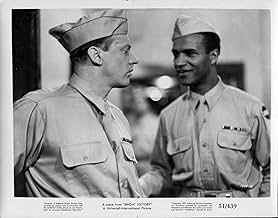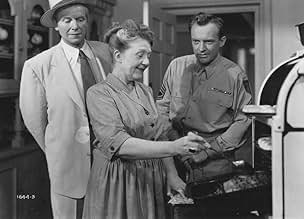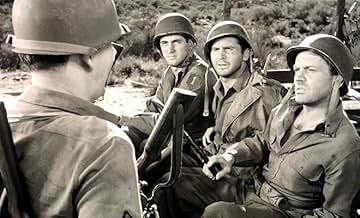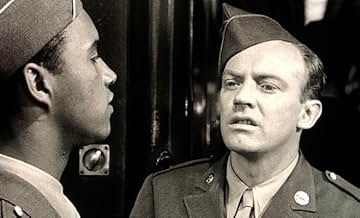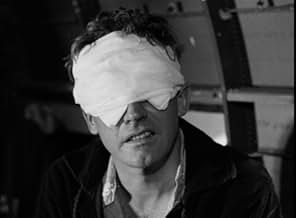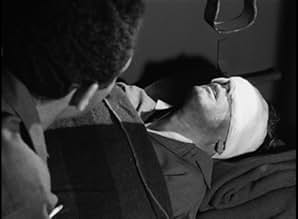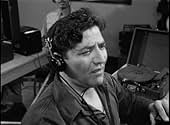IMDb RATING
7.3/10
1.2K
YOUR RATING
After he gets blinded by a German sniper's bullet in 1943, Sergeant Larry Nevins begins the long and painful road to recovery.After he gets blinded by a German sniper's bullet in 1943, Sergeant Larry Nevins begins the long and painful road to recovery.After he gets blinded by a German sniper's bullet in 1943, Sergeant Larry Nevins begins the long and painful road to recovery.
- Nominated for 2 Oscars
- 5 wins & 6 nominations total
Julie Adams
- Chris Paterson
- (as Julia Adams)
- Director
- Writers
- All cast & crew
- Production, box office & more at IMDbPro
7.31.1K
1
2
3
4
5
6
7
8
9
10
Featured reviews
10g2608671
Excellent movie
I first saw this movie as a kid in the early 60's at my dad's suggestion. He wanted me to pay attention to the real story, that being that racism has no place in a free society. I did pay attention, and to this day, his instance that I watch the movie for content is among the fondest memories I have of my Dad. He taught me how to hunt, fish, drive a car, paint a house and respect people. It is all the more remarkable, especially since I grew up in an all white town in western PA. Also, I now live no more than a few hundred yards where the movie was made. The former VF Army Hospital is now mostly under the ownership of the VF Christian College - a great resource and an asset to our community. When my family moved here some 20 years ago, we immediately discovered the "old army base" and I frequently took our kids there to walk, play on the falling down miniature golf course and just try to imagine what the facility was like when it was in use (swimming pool, gymnasium, small duck pin bowing alley, full size golf course and two fishing ponds)-- and what the presence of the base meant to Phoenixville then. I actually played handball on that court that Artuhr Kennedy is tested on for obstacle perception. The facility specialized in head and eye injuries and had a very substantial psychiatric ward as well. Anyhow, along with the anti-racism message umbered in the movie, I enjoy the scenes of the old hospital and reflect on what it looks like now. And of course,-- the scenes of old Phoenixville, although way before my time, bring a sense of nostalgia to me that is hard to describe not being a native of the area. None the less, it's there. As an aside, for anyone who is interested; Phoenixville is where they filmed The Blob with Steve McQueen -- the Colonial theater still stands to this day and has become a landmark. Oddly enough, McQueen and Kennedy would appear together in Nevada Smith years later. It is indeed a small world.
A blind man has his eyes opened
Arthur Kennedy is Larry, a man blinded in WW II battle in "Bright Victory," a 1951 film that also stars Peggy Dow, Julia Adams, James Edwards, Will Geer, Jim Backus, and Larry Keating.
Kennedy plays a southern racist whose life plan of marrying his high school sweetheart (Adams) and joining her wealthy father's business comes into doubt when he is shot and his optic nerve shattered during combat.
The film takes the viewer through Larry's training with other blind soldiers as he learns to adjust to a sightless life. One of the men, Joe (Edwards) is black and is his best buddy until Larry makes a bigoted remark (and uses the n word for extra emphasis).
A fellow soldier points out to him that from now on, he probably won't want to ask someone's race and religion before deciding if they pass muster. This sets Larry thinking.
He meets a sympathetic young woman, Judy (Dow), who falls for him but has to let him go home to the life he has there. But when Larry returns to his family, he finds that because he's changed, the world around him has changed, too.
This looks to be a B movie but Kennedy received an Oscar nomination for Best Actor, and the acting in the film is A quality, as is the script and direction. Kennedy is excellent and does one thing, I believe intentionally, that is remarkable. At least to these ears, he has no southern accent in the beginning of the film. When he returns home, you start to hear a southern accent in his voice.
Now, some might say that Kennedy's southern accent was in and out - I don't believe that was the case. He did what a lot of people with an 'acute ear' do - he picked up the accent of those around him. As a blind man, of course, his ear would even be more acute, and in several scenes, he is shown to have a unique "radar" ability for "feeling" when he is near a building, which is considered by the Army to be a unique gift not shared by many. It would then be in character for him to easily fall in and speak with the same intonation as the accents around him.
Kennedy, of course, went on to have a strong career as a character actor (and receive more Oscar nominations) while one of the bit players in the film, Rock Hudson, who is fairly bad even with a couple of lines, hit the superstardom jackpot. Fortunately, Hudson improved greatly before being handed leads.
Julia Adams is lovely (and strongly resembles actress Connie Selleca) as Larry's frustrated girlfriend, and Dow is sympathetic as the girl left behind. After a few more movies, the very pretty Dow quit her film career to marry and subsequently raised five children. Will Geer, Larry Keating, and Jim Backus, three strong character actors, appear in this film as well.
"Bright Victory" is an excellent movie and well worth watching, particularly for the complicated personality created by Arthur Kennedy.
Kennedy plays a southern racist whose life plan of marrying his high school sweetheart (Adams) and joining her wealthy father's business comes into doubt when he is shot and his optic nerve shattered during combat.
The film takes the viewer through Larry's training with other blind soldiers as he learns to adjust to a sightless life. One of the men, Joe (Edwards) is black and is his best buddy until Larry makes a bigoted remark (and uses the n word for extra emphasis).
A fellow soldier points out to him that from now on, he probably won't want to ask someone's race and religion before deciding if they pass muster. This sets Larry thinking.
He meets a sympathetic young woman, Judy (Dow), who falls for him but has to let him go home to the life he has there. But when Larry returns to his family, he finds that because he's changed, the world around him has changed, too.
This looks to be a B movie but Kennedy received an Oscar nomination for Best Actor, and the acting in the film is A quality, as is the script and direction. Kennedy is excellent and does one thing, I believe intentionally, that is remarkable. At least to these ears, he has no southern accent in the beginning of the film. When he returns home, you start to hear a southern accent in his voice.
Now, some might say that Kennedy's southern accent was in and out - I don't believe that was the case. He did what a lot of people with an 'acute ear' do - he picked up the accent of those around him. As a blind man, of course, his ear would even be more acute, and in several scenes, he is shown to have a unique "radar" ability for "feeling" when he is near a building, which is considered by the Army to be a unique gift not shared by many. It would then be in character for him to easily fall in and speak with the same intonation as the accents around him.
Kennedy, of course, went on to have a strong career as a character actor (and receive more Oscar nominations) while one of the bit players in the film, Rock Hudson, who is fairly bad even with a couple of lines, hit the superstardom jackpot. Fortunately, Hudson improved greatly before being handed leads.
Julia Adams is lovely (and strongly resembles actress Connie Selleca) as Larry's frustrated girlfriend, and Dow is sympathetic as the girl left behind. After a few more movies, the very pretty Dow quit her film career to marry and subsequently raised five children. Will Geer, Larry Keating, and Jim Backus, three strong character actors, appear in this film as well.
"Bright Victory" is an excellent movie and well worth watching, particularly for the complicated personality created by Arthur Kennedy.
Coping With Blindness
Poignant account of blinded war veteran adjusting to civilian life. Though the premise has built-in emotional appeal, that fine actor Arthur Kennedy prevents the tale from becoming too sappy or even sentimental. Understandably, there were a number of these "adjustment" movies made after WWII, The Best Years Of Our Lives (1946), and The Men (1950), to name two. More than the others, I think, BV follows one man's (Kennedy) difficulties in re- integrating with family, love life, and community. Naturally, films of this type sought to be uplifting and optimistic in dealing with a devastating post-war problem. BV is no exception. Then too, the racial subtext is well-handled, bringing to the surface those inner qualities that are often overridden by outer appearance. In that sense, Larry's (Kennedy) perception is ironically sharpened by blindness once he figures out the lesson.
The movie's well-made, using actual locations such as city sidewalks, VA hospitals, and train stations, all of which provide a realistic feel. Then too, what guy wouldn't like being helped along by the likes of Judy (Dow) who resembles June Allyson's sexy older sister. Too bad, her accomplished career was so short. Just as regrettable is the amazing James Edwards, one of the first Blacks to get dignified roles. Seems his pioneering career was over-shadowed by the equally charismatic Sydney Poitier.
All in all, the movie surpasses its time because of the common humanity that appeals beneath one man's courageous struggle.
The movie's well-made, using actual locations such as city sidewalks, VA hospitals, and train stations, all of which provide a realistic feel. Then too, what guy wouldn't like being helped along by the likes of Judy (Dow) who resembles June Allyson's sexy older sister. Too bad, her accomplished career was so short. Just as regrettable is the amazing James Edwards, one of the first Blacks to get dignified roles. Seems his pioneering career was over-shadowed by the equally charismatic Sydney Poitier.
All in all, the movie surpasses its time because of the common humanity that appeals beneath one man's courageous struggle.
A continuing lesson
Of course I always loved Bright Victory, since my dad was one of the blinded veterans used as extras in the movie. I remember him telling me that Kennedy had dark contacts in, and would yell out to remove them as soon as a scene was over.My dad said he felt like calling out, "But I can't remove mine!" It is a wonderful story of many blinded vets, particularly at that time. A captain was accompanying my dad and another blind soldier, who happened to be black, to their homes in GA. When they came to the train station in DC, they were informed that the black man could no longer ride in the same car. Both the captain and my dad were outraged for this soldier who had also gave his sight for his country. A new car was added to the train, and the 3 soldiers had it all to themselves. I was proud of my dad and the captain for taking that stand. They are deceased, but the lesson of the train, and the lesson of "Bright Victory" are both stories I pass on to my child and to my students over 32 years.
Compares favorably with "Best Years of our Lives"
I stumbled upon this excellent and compelling film during AMC's "Veterans' Day Movie Marathon." Dealing with a soldier's (Arthur Kennedy) rehabilitation after losing his sight during WWII in surprisingly frank ways for its time (released in 1951), this seems to me to be the first time I saw raw racism and its consequences in a film. A superb love story on the surface, it's the underlying themes of classism, racism and realistically dealing with the handicapped which set it a notch above the terrific 1946 film, "The Best Years of our Lives." Face it, Harold Russell, while a hero, was no actor. The electricity between Kennedy and his new "friend" (played by Peggy Dow ~ whatever became of this talented actress? Her career lasted only 4 years) is remarkable. Happy ending doesn't detract.
Did you know
- TriviaTen blind WWII veterans at the hospital appeared as extras and were advisers for this film.
- GoofsThe locomotive pulling the train when Joe arrives home in Florida was not produced by American Locomotive Company until 1950, seven years after the actual event. Diesel locomotives were not used on local trains until after the war years.
- Quotes
Larry Nevins: I told ya i wanted security, remember... well I was looking for it in all the wrong places. Nobody can ever give it to you Judy. That way, it costs too much, you gotta make it for yourself.
- How long is Bright Victory?Powered by Alexa
Details
- Runtime
- 1h 37m(97 min)
- Color
- Aspect ratio
- 1.37 : 1
Contribute to this page
Suggest an edit or add missing content

